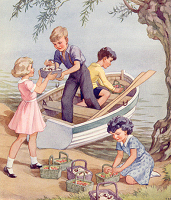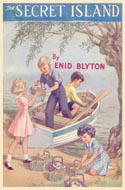
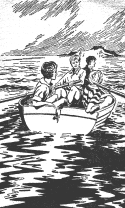
The children escape to the island!
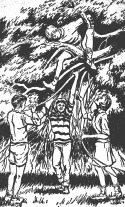
Jack shows them how to build a house using willow trees.
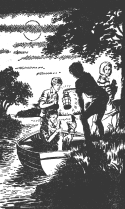
Back from the mainland at last, Jack has news—and six hens!
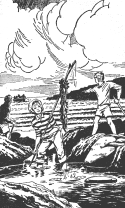
The children are busy fishing when they spot a boat coming towards the island.
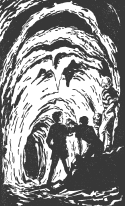
The caves will make a perfect home for the winter, and a great hidey-hole in case anyone comes looking for them.
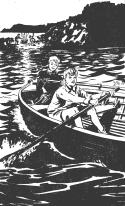
Jack and Mike row quickly back to the island, having narrowly escaped capture!
The Secret Island
Review by Keith Robinson (March 24, 2006)What a great story this is! The first in the "Secret" series was originally written as a serial and published week-by-week in a magazine. Then, in 1938, it was published as a novel, one of Blyton's first. This is a book that stands the test of time, and is all the more appealing because it more or less constitutes the first use of well-worn Blyton themes such as children living away from home on their own, exploring caves, outwitting adults, and so on. All that's missing here is treasure!—and a dog.
These particular childen are Mike, Nora, and Peggy (siblings), and their friend Jack from a nearby farm. Mike and Nora are twins, although Nora is quite a bit smaller than Mike and a bit of a lazy so-and-so. Peggy is a year older than her brother and sister, and quite sensible and reliable. It's stated in the book that "nobody knew how old Jack was," including himself; but this isn't much of a concern since the reader isn't told how old Mike, Nora and Peggy are either. All we know about the children—and perhaps all we need to know—is that they're young, most likely the same age as whoever happens to be reading the book (a pretty neat trick, actually).
The three siblings are unhappy. Their parents, Captin and Mrs Arnold, "built a fine new aeroplane" and flew off to Australia in it. But somewhere along the way they vanished and nothing more was heard from them. Ever since then, for two long years, the children have been living with their Aunt Harriet and Uncle Henry, who are really quite horrid! "Aunt Harriet slapped me six times this morning," says Nora, crying, "for not washing the curtains properly." Meanwhile Peggy is sent to bed for burning a cake, and Mike spends all his time out in the fields helping his uncle. None of the children go to school now, and they spend their lives doing all the chores around the place.
But Jack has a plan. Curiously, while his friends' dire situation is described in some detail, Jack's background is a little vague. He lives with his granddad, who reportedly is thinking of going to live with Jack's aunt, meaning Jack will be left all alone. I can't imagine such a situation in this day and age, but this was in the 1930s. Jack's never had nice things, and runs about barefoot all the time (as quite a few helpful local characters have been known to do in Blyton's books). So Jack's situation is explained away in broad brushstrokes, thus setting up for the story to come...
"I know a place where nobody could find us," says Jack, "if we ran away!"
The place turns out to be a secret island on a very large lake. The lake is surrounded by woods, and apparently nobody even knows the island is there, so it remains unexplored by anyone, ever. This is a little hard to believe, but it's perfectly fine to believe that hardly anyone ever bothers to go there, and that's all we need to believe to make this story work. So Jack gets out his leaky boat and takes the children over to show them. Oh, what a marvellous place! Full of willow trees, tame rabbits, caves, a sandy shore, plenty of blackberries, and lots more. The children make up their minds immediately to run away to the island, and they set a date for "next Sunday."
What follows is a fun, exciting week where the children smuggle all manner of things out of the house to store inside a hollowed-out tree by the lakeside, ready to load into Jack's boat for their jouney to the island. It's quite staggering, the amount of stuff they make off with, and when the time comes to leave, the boat is positively overloaded with supplies. And so the adventure begins.
There are many enjoyable scenes that follow, the first of which is the building of the house. Yes, the children build themselves a little house to live in, formed from six close-growing willow trees that they bend over at the top to meet in the middle, and tie together to form the structure of a roof. The walls are made from more willow branches, stuck into the ground and then interwoven with thinner willow sticks. The beauty of the house, Jack explains, is that willows never die, and the branches will continue to grow for years to come! This means their cosy little house is a living house, getting greener by the day.
Food becomes a priority early on, as their supplies quickly run dry. Jack fetches hens from his granddad's farm, and reports that his granddad has locked up and gone off to live elsewhere, leaving a helper to stop by each day to see to the animals until something more permanent is decided. Jack also reports that the police have been out looking everywhere for the missing children.
With fresh eggs now available, Jack sets his sights higher; he decides to bring his cow, Daisy, to the island! Towing the cow behind the boat seems like a good idea, but I can't imagine a cow swimming so far. The poor thing! But once there, at least Daisy is not likely to go running off. Now the children have plenty of milk to go along with their skinned rabbits, fish, and berries. They start planting vegetables, and soon have an array of lovely side dishes!
But all good things have to turn sour, otherwise there wouldn't be much of a story. Actually, in this case the story is absorbing enough without introducing major worries like day-trippers, but when a boatload arrives one day, the children realize how vulnerable to discovery they are should anyone specifically come looking for them. They start making plans, and these include walking Daisy into the caves and getting her used to the darkness in case anyone really does come looking.
And of course they do...
Overall, this story remains a personal favorite, with an ending that provides the nicest warm fuzzy feeling you're likely to read in any children's book. A masterpiece!
The Secret Island
Review by Laura Canning (July 6, 2006)A masterpiece indeed. This reads really well, without any of the tired plot devices found in later books like some of the Famous Five books. And the old theme of children's literature—children surviving on their own without any nasty adults—is handled brilliantly. Blyton makes it seem so logical that the children would make a willow house, would think of sinking their boat while they're not using it and would practice hiding all traces of themselves on the island just in case people come looking for them. Children just wouldn't be that smart, says one man who comes looking for them. Hee hee!
The characters themselves are all good too, without the 'annoying youngest girl' usually present in these two-boy-two-girl adventure stories. Jack is an excellent character, full of knowledge and common sense, while Peggy is a good sensible lass without being too stereotypical. Mike is pretty much a standard 'Dick from Famous Five' sidekick, although there is more equality between him and Jack than Dick and Julian. Nora, his twin, doesn't spend most of the book going 'Ooh, I'm frightened', a la Lucy Ann (Adventure) and Anne (Famous Five), even though there are a few tears as she learns to pull her weight and stop being lazy. It wouldn't be a Blyton book without a healthy dose of self-improvement!
There are so many things in this book I like. Just reading about how the children survive on the island is interesting enough, but Blyton introduces extra tension by having first trippers then searchers come to the island (minor blooper: doesn't Jack say at the start that no-one knows about the island?). And the parts where Jack goes to the market to sell wild mushrooms and strawberries are excellent. And the start of the book, where the children gradually bring all their provisions down to the magical tree that holds everything... I reread this recently after reading it as a kid, and was almost as captivated again this time round. One of Blyton's best and one of my all time favorites.


